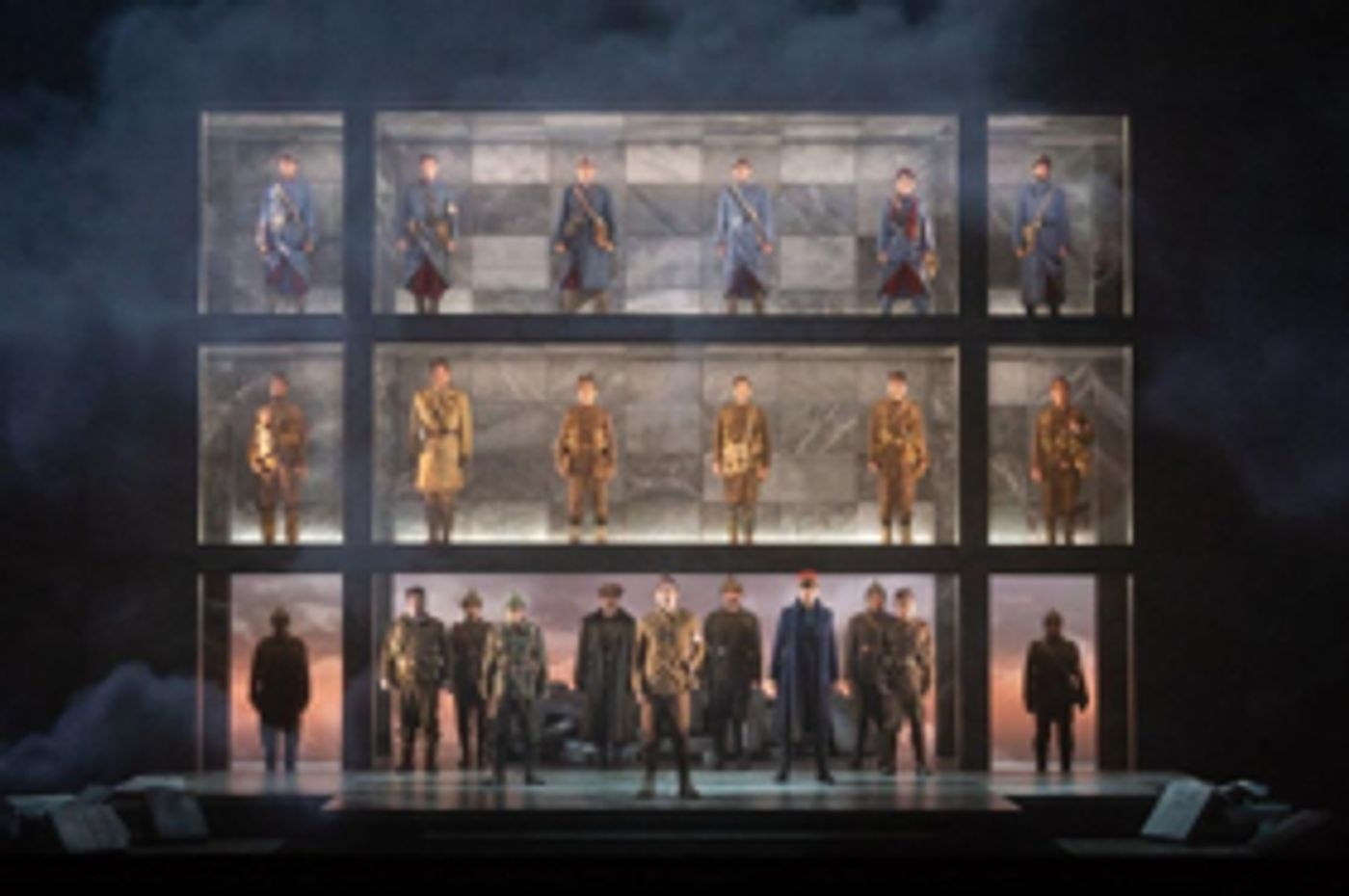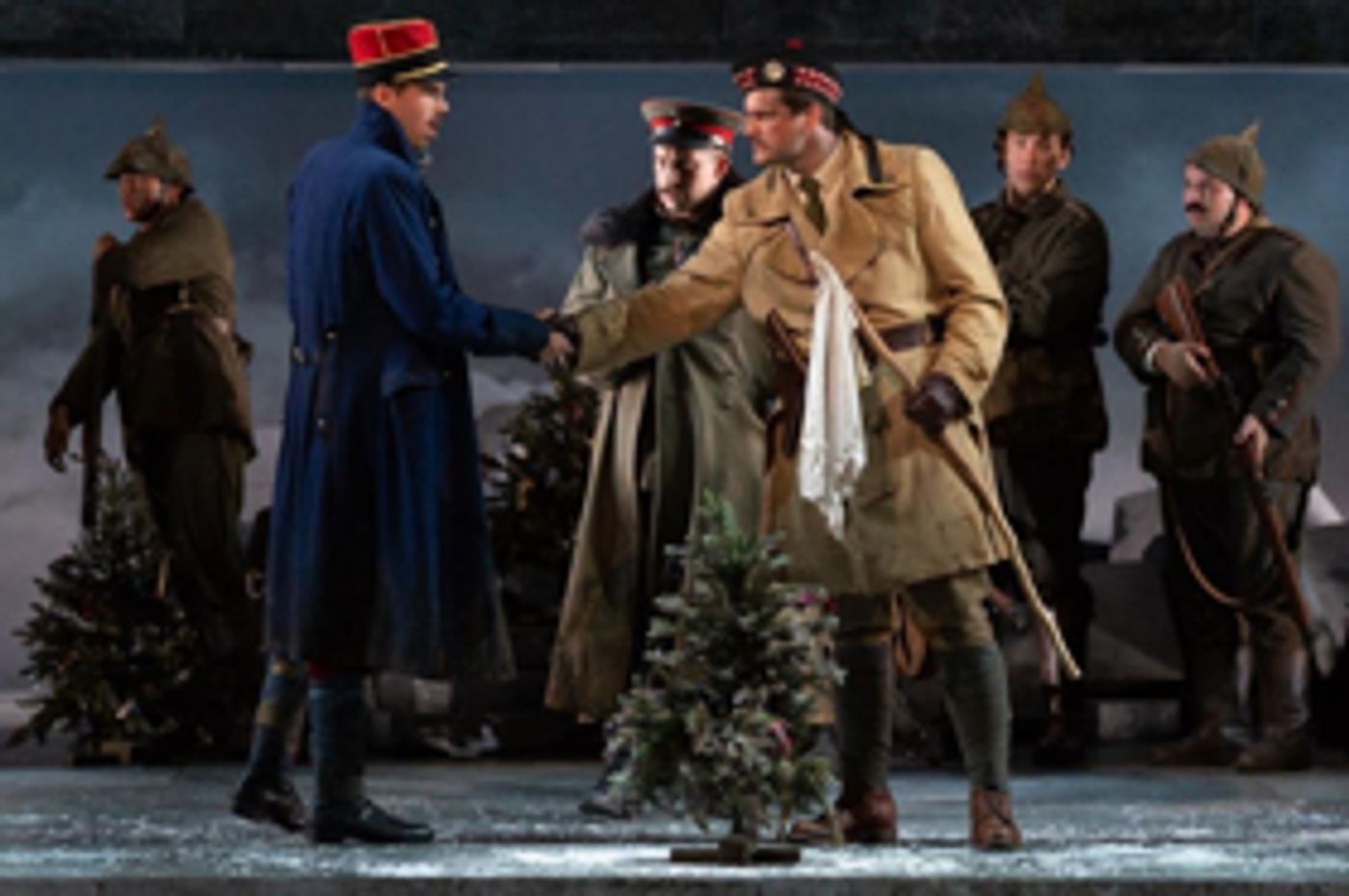Review: A Weekend in the Country at Glimmerglass Festival, Part One, SILENT NIGHT

NIGHT. Photo: Karli Cadel/The Glimmerglass Festival
None of the three pieces that I saw at the Glimmerglass Festival near Cooperstown, NY, last weekend was exactly what it seemed to be.
Is Janacek's CUNNING LITTLE VIXEN a fairy story or a cautionary tale? Is the Bernstein-Sondheim-Laurents WEST SIDE STORY a musical, an opera or simply undefinable? Does the Puts-Campbell Pulitzer Prize-winner, SILENT NIGHT, find that war, in general, is hell--or that sometimes hell is simply other people?
In this multi-part review, I'm going to begin with SILENT NIGHT, which I thought was the most successful of the three--not because of the pieces themselves, the productions or the Festival Orchestra under three different conductors, but because of casting. First there was the need for more seasoning from many in the Glimmerglass Young Artists Program, who sang many of major roles, though as a whole, the cast of SILENT NIGHT was just right. Then, I wondered whether the choice for VIXEN to be performed in English rather than the original Czech was for the sake of the young performers, who doubled and tripled roles in the trio of works.

Bryan. Photo: Karli Cadel/The Glimmerglass Festival
I saw the same sensitively directed production of SILENT NIGHT (different cast) previously at the Atlanta Opera, where director Tomer Zvulun is also General and Artistic Director, and found it even more moving the second time around--no small achievement for a contemporary piece. It is easy to see why this has become one of the most popular of new works to be performed at companies across the nation.
It would be a hard, cold person not to be moved by the brilliant score by Puts, working in unison with the clearly defined characters and poignant story by Campbell. Here, cast with singers close in age to the the characters they portrayed, it blew me away.
Puts's gorgeous, inspired, finely layered orchestral interludes turn the Festival Orchestra, under the insightful baton of Nicole Paiement (Artistic Director and conductor of San Francisco's Opera Parallele), into another character in the work. But it was his remarkable skill in a wide variety of styles that was most impressive.
These ranged from the discord of the opera's first notes that led into a Mozartian aria with which two German characters open the prologue [before a German military man closes it down, announcing that war has been declared], to the Scottish-style songs that the men sing to remind themselves of home, to the more modern music that accompanied the uglier aspects of war.
The opera takes place during the first Christmas season of World War I, with three interweaving stories--about Scottish, French and German soldiers, their commanding officers, and their families--and the agreement to permit a temporary truce on Christmas Eve.
Act I ends as the truce begins--with the men tentatively leaving their own bunkers to share their provisions and meet each other as people and not combatants. I must admit that it left me a bit teary as we were drawn even further into their stories--remarkably without a bit of schmaltz but with real feelings, thanks to Campbell's smart libretto.
When the truce ends in Act II, one might think the opera has no place to go...but that would be wrong. Even after word gets back to the three military headquarters that the unsanctioned truce has interrupted the scheduled bloodshed, the opera doesn't lose its heart--or surprises--as it catapults toward the inevitable tragedy that the war must bring.
Zvulun drew some well-honed work from the young singers in drawing on the words and music of the creators, with Paiement adding her own skilled musicality to the drama we saw and heard on stage.
On the German side, tenor Arnold Livingston Geis turned in a thoughtful, well-sung performance as Nikolaus Sprink, the opera singer conscripted at the start of the piece who later chooses prisoner-of-war status over killing, while baritone Michael Hewitt excelled as Lieutenant Horstmayer, with his surprising secret kept under wraps until the end.
Among the French contingent, baritone Michael Miller was a strong Lieutenant Audebert with his touching song of home, even against the scene-stealing turn of baritone Conor McDonald as his aide, Ponchel. Of the Scots, baritone Jonathan Bryan was an excellent Lieutenant Gordon and tenor Christian Sanders was the emotionally wounded Jonathan Dale, who kept the news of his brother's death on the battlefield from his family back home.
Victoria (Vita) Tzykun's costuming showed a fine eye, whether in the pastiche opera scene or on the battlefield where we had to know who-was-who. Erhard Rom's three-tiered set, with Robert Wierzel's lighting, helped intertwine the three armies' stories efficiently, while also leaving room for the men to extend their hands in friendship and mingle in celebration. (Having seen Peter J. Davison's set for WEST SIDE STORY the night before, where Maria's room swiveled from exterior to interior view, I wondered if Rom's set for SILENT might have been even more effective with some movable elements to bring the men closer to us.)
As the combatants learned about each other's humanity, and even though we know that the worst is still to come for many of the men and their comrades, hope and honor glimmer in the background of SILENT NIGHT. It might even give us more hope in our own troubled times.
Reader Reviews
Videos

